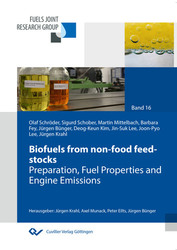| Fachbereiche | |
|---|---|
| Buchreihen (97) |
1381
|
| Nachhaltigkeit |
3
|
| Gesundheitswesen |
1
|
| Geisteswissenschaften |
2369
|
| Naturwissenschaften |
5408
|
| Mathematik | 229 |
| Informatik | 319 |
| Physik | 980 |
| Chemie | 1364 |
| Geowissenschaften | 131 |
| Humanmedizin | 243 |
| Zahn-, Mund- und Kieferheilkunde | 10 |
| Veterinärmedizin | 108 |
| Pharmazie | 147 |
| Biologie | 835 |
| Biochemie, Molekularbiologie, Gentechnologie | 121 |
| Biophysik | 25 |
| Ernährungs- und Haushaltswissenschaften | 45 |
| Land- und Agrarwissenschaften | 1005 |
| Forstwissenschaften | 201 |
| Gartenbauwissenschaft | 20 |
| Umweltforschung, Ökologie und Landespflege | 148 |
| Ingenieurwissenschaften |
1795
|
| Allgemein |
98
|
|
Leitlinien Unfallchirurgie
5. Auflage bestellen |
|
Erweiterte Suche
Biofuels from non-food feed-stocks (Band 16)
Preparation, Fuel Properties and Engine Emissions Final Report
et al. (Herausgeber)Olaf Schröder (Herausgeber)
Vorschau
Inhaltsverzeichnis, PDF (100 KB)
Leseprobe, PDF (250 KB)
The production of biodiesel is often criticized because of the use of eatable oils like palm oil, soybean oil or rape seed oil. Therefore, researchers from Austria, South Korea, and Germany investigated waste oils from different production processes. In detail, fish oil and rubber tree oil were transesterified with methanol to produce biodiesel.
These highly unsaturated biodiesels were tested in a single cylinder diesel engine with respect to their regulated and non-regulated emissions and their health effects. Additionally, the biodiesels were partly hydrogenated to improve the oxidation stability.
| ISBN-13 (Printausgabe) | 9783736991996 |
| ISBN-13 (E-Book) | 9783736981997 |
| Buchendformat | A5 |
| Sprache | Englisch |
| Seitenanzahl | 74 |
| Umschlagkaschierung | glänzend |
| Auflage | 1. Aufl. |
| Buchreihe | Fuels Joint Research Group - Interdisziplinäre Kraftstoffforschung für die Mobilität der Zukunft |
| Band | 16 |
| Erscheinungsort | Göttingen |
| Erscheinungsdatum | 10.03.2016 |
| Allgemeine Einordnung | Sachbuch |
| Fachbereiche |
Chemie
Organische Chemie Land- und Agrarwissenschaften Maschinenbau und Verfahrenstechnik |








